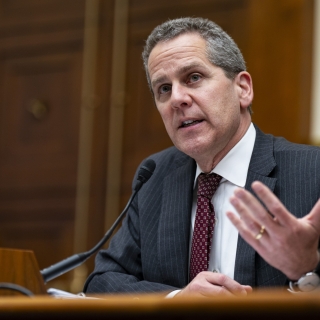


Federal Reserve Vice Chairman for Supervision Michael Barr delivered remarks before the Council on Foreign Relations today, discussing the state of the economy, inflation, and policy uncertainty.
Barr sounded a positive note about the economy, citing strong growth over the past year and low and stable unemployment. He also noted the substantial progress that has been made on inflation, while acknowledging that there is still much work to be done. He described the path to 2% inflation as "bumpy but steady."
Barr also discussed the spike in inflation that occurred in January, attributing it to anticipated seasonal patterns. He expects it to ease in February or March, although changes in the policy environment could affect this.
When asked about tariffs, Barr stated that it is too early to tell how tariffs will affect the economy. He emphasized the uncertainties that remain about policy, such as which products will be affected, the duration of the tariffs, and whether they will be permanent or temporary.
Barr expressed his preference for understanding policy first, then assessing its implications for the economy, and finally its impact on monetary policy.
He reassured that the Federal Reserve is closely monitoring the data as it develops, and is prepared to act if inflation falls faster than expected or if the labor market weakens more than projected.
Barr also said that it is too early to predict the impact of immigration policy on the economy and, by extension, monetary policy. He noted that, in theory, a reduction in employment could lead to a decline in potential output, but indicated that the Federal Reserve will see if this impact is significant.(Newsmaker23)
Source: Investing.com
US President Donald Trump said Washington is willing to provide security assistance to Ukraine as part of a deal to end the war with Russia. He emphasized that security support is a crucial factor in ...
President Donald Trump has threatened to impose an additional 5% tariff on imports from Mexico if the country does not immediately release water supplies that the U.S. government says are due under a ...
President Donald Trump announced an $11 billion aid package for American farmers, particularly soybean farmers, who have been hit by the trade war and falling crop prices. Tariffs against many countri...
US President Donald Trump expressed disappointment with Ukrainian President Volodymyr Zelenskiy's response to Washington's peace proposal to end the war with Russia. According to Trump, Kyiv hasn't mo...
President Donald Trump announced a new peace pact between Rwanda and the Democratic Republic of Congo, which he linked to US access to critical minerals. At a meeting in Washington, Trump claimed his ...
Gold today tended to move slightly around $4,300/oz as the market "held its breath" after the release of US data and awaited the next trigger. Buyers are still present, but many traders are reducing risk due to the busy week ahead.Fundamentally,...
US President Donald Trump is scheduled to interview Federal Reserve Governor Christopher Waller on Wednesday. The interview is said to be part of the selection process for the top position at the US central bank, according to sources quoted by the...
The Nikkei 225 index weakened slightly by 0.1% to 49,336.22 after losing early gains. This decline followed declines in most US stock markets in the previous session, prompting Japanese investors to remain cautious. US employment data released...
 New York Federal Reserve President John Williams said on Monday the U.S. central bank's interest rate cut last week leaves it in a good position to...
New York Federal Reserve President John Williams said on Monday the U.S. central bank's interest rate cut last week leaves it in a good position to...
 Stocks rose Monday led by a broad array of names as traders bet data set for release this week will point to tame inflation and strong economic...
Stocks rose Monday led by a broad array of names as traders bet data set for release this week will point to tame inflation and strong economic...
 Asian markets opened lower in the last full trading week of 2025, fueled by concerns about the prospects for tech company profits and growing AI...
Asian markets opened lower in the last full trading week of 2025, fueled by concerns about the prospects for tech company profits and growing AI...
 Pasangan mata uang EUR/USD mengawali pekan ini dengan nada sedikit melemah di sesi Asia, diperdagangkan di sekitar 1,1730, turun kurang dari 0,10%...
Pasangan mata uang EUR/USD mengawali pekan ini dengan nada sedikit melemah di sesi Asia, diperdagangkan di sekitar 1,1730, turun kurang dari 0,10%...